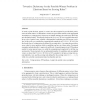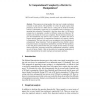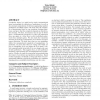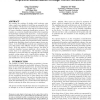205 search results - page 4 / 41 » Elections Can be Manipulated Often |
JCSS
2010
13 years 6 months ago
2010
To make a joint decision, agents (or voters) are often required to provide their preferences as linear orders. To determine a winner, the given linear orders can be aggregated acc...
CLIMA
2010
13 years 8 months ago
2010
When agents are acting together, they may need a simple mechanism to decide on joint actions. One possibility is to have the agents express their preferences in the form of a ballo...
CORR
2012
Springer
12 years 3 months ago
2012
Springer
All previous work on “candidate-control” manipulation of elections has been in the model of full-information, simultaneous voting. This is a problem, since in quite a few real...
ATAL
2008
Springer
13 years 10 months ago
2008
Springer
Complexity theory is a useful tool to study computational issues surrounding the elicitation of preferences, as well as the strategic manipulation of elections aggregating togethe...
DAS
2010
Springer
13 years 11 months ago
2010
Springer
We consider the problem of dealing with irrelevant votes when a multi-case classifier is built from an ensemble of binary classifiers. We show how run-off elections can be used to...




